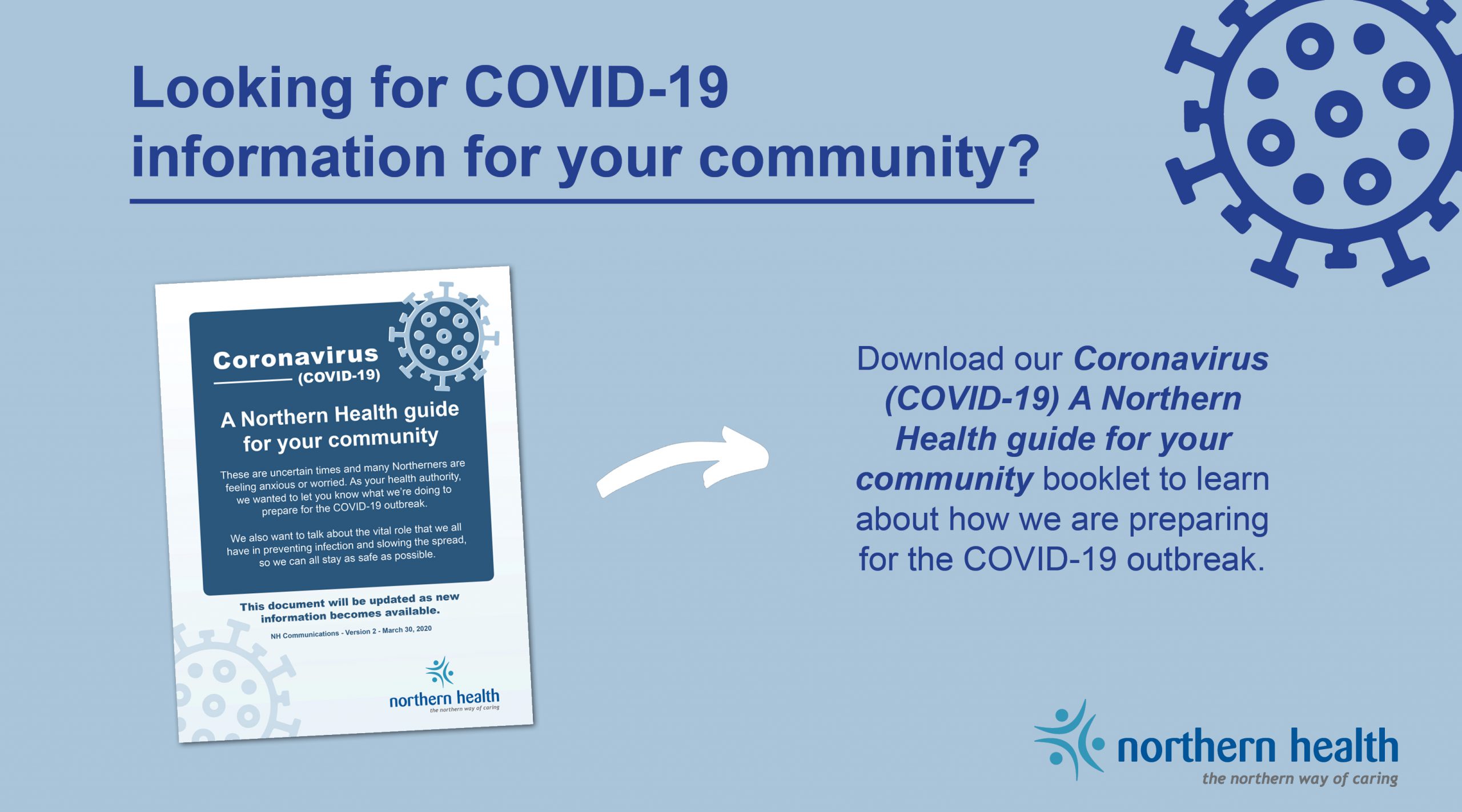A Northern Health Guide For Your Community
These are uncertain times and many Northerners are feeling anxious or worried. As your health authority, we wanted to let you know what we’re doing to prepare for the COVID-19 outbreak.
We also want to talk about the vital role that we all have in preventing infection and slowing the spread, so we can all stay as safe as possible.
The following info is excerpted from the NH COVID-19 Community Guide. Please see the full document available for download from our website here: COVID-19 Northern Health Community Guide
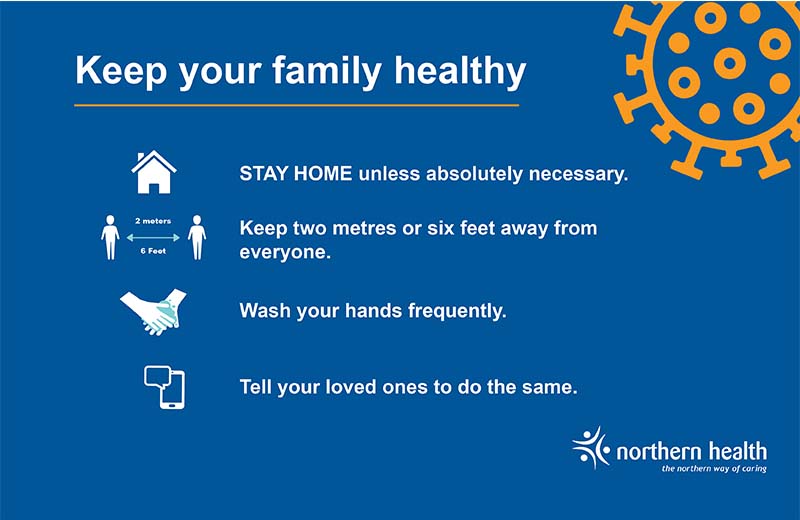
What is coronavirus/COVID-19?
A new coronavirus has caused an outbreak of respiratory illness known as COVID-19. Many of the characteristics of COVID-19 are still unknown, but mild to severe illness has been reported for confirmed cases.
What are the symptoms?
The symptoms of COVID-19 are similar to those of other respiratory infections, including the flu. COVID-19 symptoms can include some or all of the following:
- Cough
- Fever
- Breathing difficulties
- Headache
- Generalized muscle pain
- Sore throat
Some people with the infection will have mild symptoms, or none at all, but they can still spread the virus to others – who might develop more severe symptoms.
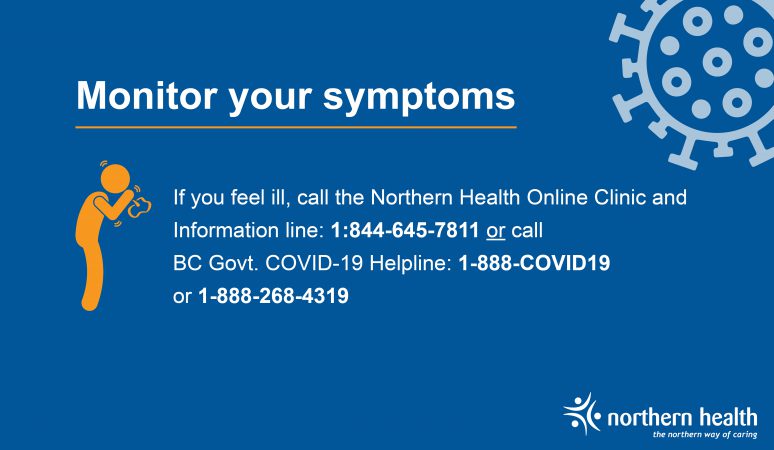
How serious is it?
About 81% of cases are mild, and 19% are serious. “Serious” means the person has to go into hospital.
Of those 19%, 5% need intensive care and ventilator support (a machine to take over breathing for the patient while their body fights the virus).
The death rate is 1%, but this is higher in areas where the health care system is overwhelmed.
Who is most at risk of severe illness?
People of all ages can be infected by the new coronavirus. People over 70, and people with pre-existing medical conditions (such as asthma, diabetes, or heart disease) are more likely to be severely ill.
What is the risk in pregnancy?
Based on the evidence we have so far, pregnant women are no more likely to get COVID-19 than the general population.
In some women, pregnancy changes how your body responds to severe viral infections. This is something midwives and obstetricians have known for many years and are used to dealing with.
Currently, there is no evidence that pregnant women who get this infection are more at risk of serious complications than any other healthy individuals, but the amount of evidence available is quite limited, so if you’re pregnant, please take extra care.
For more information, check http://www.bccdc.ca/health-professionals/clinical-resources/covid-19-care/clinical-care/pregnancy
How is COVID-19 spread?
COVID-19 spreads mainly through tiny drops of saliva or discharge from the nose when an infected person coughs or sneezes. This means it’s very important to cough or sneeze into your elbow, or into a tissue.
How can I avoid getting and spreading the virus?
1. Practice physical distancing.
Physical distancing saves lives by reducing the chance you will become infected. It also slows the spread of infection over a longer period of time, so Northern Health has a better chance of keeping up. It’s everyone’s responsibility to practice social distancing, whether you have symptoms or not.
- Avoid close contact with other people. Keep at least 2 meters (6 feet) away from them.
- Avoid public transport – buses, taxis, ride-sharing.
- Work from home – speak to your employer about this.
- Avoid social activities such as going to cafes, pubs, restaurants, or movie theaters.
- Avoid events with groups of more than 50 people.
- Avoid going on children’s playdates, such as going to a playground or park.
- Don’t have visitors to your home. This includes friends and family (other than the family members you live with).
- Don’t go to your doctor’s office without phoning ahead.
- If you have questions, call your family doctor or nurse practitioner. You can also call the NH COVID-19 Online Clinic at 1-844-645-7811.
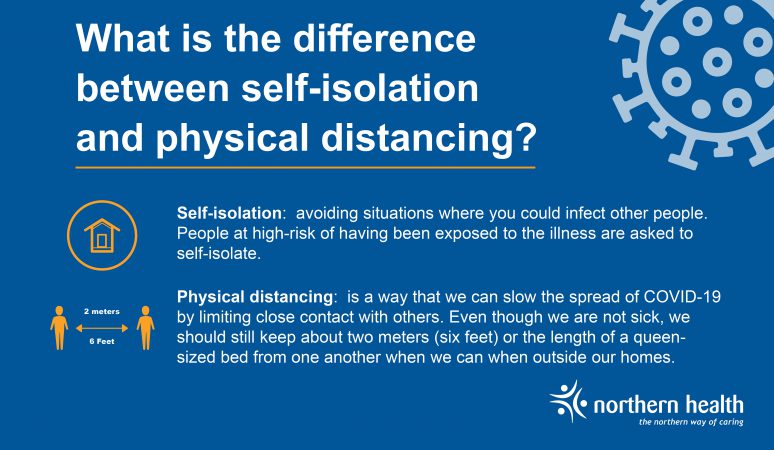
2. Wash your hands often.
- Wash your hands often with soap and water– for at least 20 seconds.
- Always wash your hands when you get home or arrive at work.
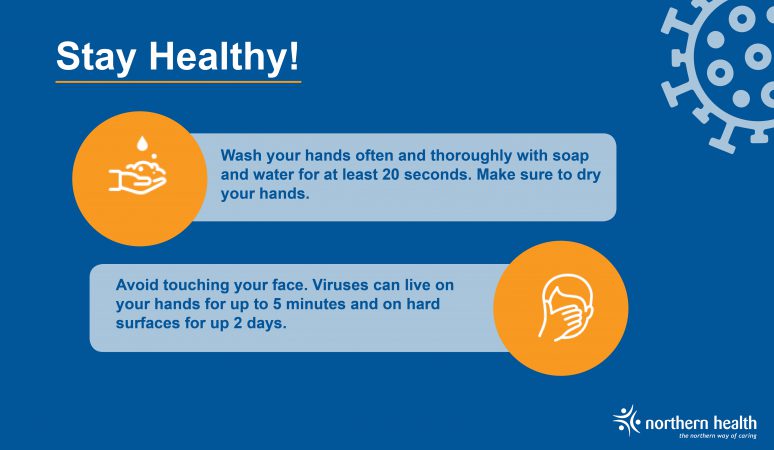
3. Use hand sanitizer.
- If soap and water are unavailable, use hand sanitizer.
4. Use coughing etiquette
- Cough or sneeze into your elbow, or into a tissue.
- Put used tissues in the garbage immediately, and then wash your hands.
5. Avoid touching your face
- Avoid touching your face, eyes, nose, or mouth.
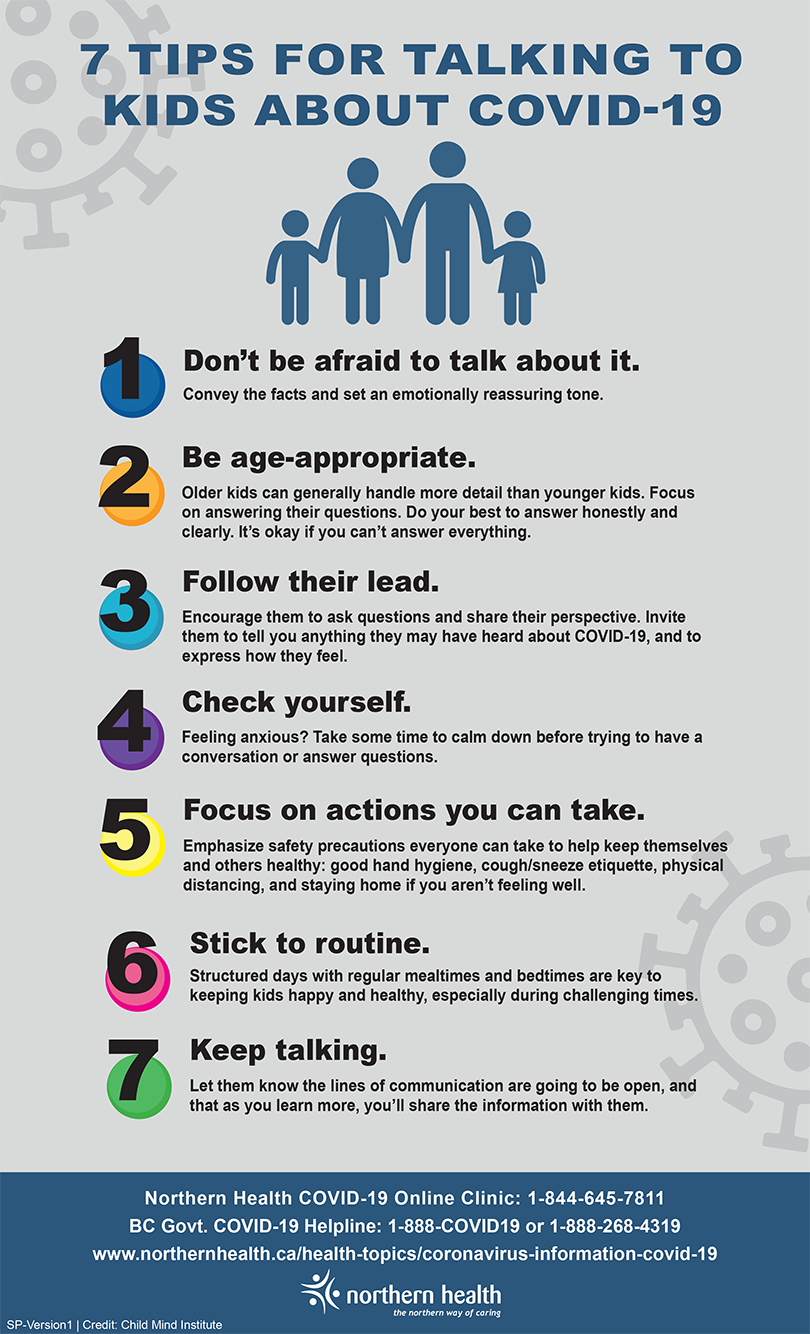
Tips for physical distancing
We’re asking you to avoid physical contact with people outside your home, including those you love and enjoy spending time with.
We know this will be difficult, especially for people who are already isolated. Some tips:
- Use technology to connect remotely.
- Setting elderly family members up with technology to allow for video calls can be a big help.
- Ask your elderly or vulnerable family members, neighbours, and friends if you can drop groceries off (on their front porch) for them.
- Neighbourhood Facebook or WhatsApp groups can help people connect and look after each other.
- Check out the cards at the end of this booklet. If you like, leave some on the front steps of houses along your street to offer help to those who are staying at home.
How long will we need to be physically distant?
We all need to follow the recommendations of our public health officer, health authorities, and government. Right now, it’s everyone’s responsibility to slow the spread.
We don’t know the timeline yet, but you can count on Northern Health to keep you informed.
Mental health resources:
We know that this is an uncertain time and can trigger significant stress. The following resources can provide tips for managing COVID-19 stress, anxiety, and depression.
- Managing COVID-19 Stress, Anxiety, & Depression: http://www2.gov.bc.ca/gov/content/health/managing-your-health/mental-health-substance-use/managingcovid-stress
- COVID-19 and Anxiety: http://www.heretohelp.bc.ca/infosheet/covid-19-and-anxiety
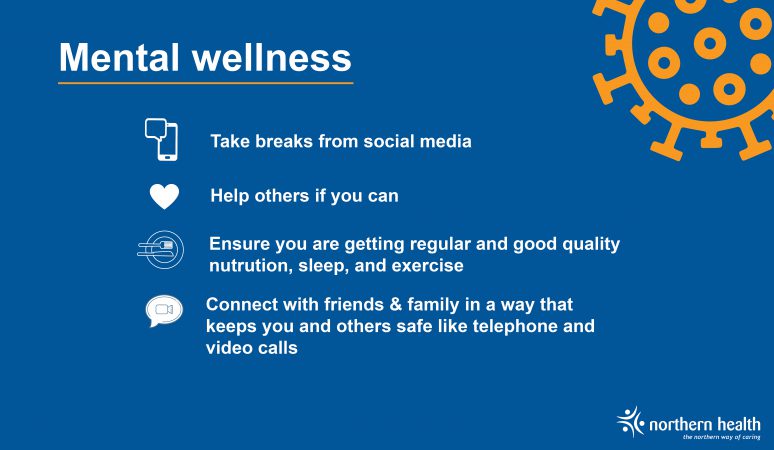
If you need help:
Crisis Intervention and Suicide Prevention Centre
- Provides confidential, non-judgmental, free emotional support for people experiencing feelings of distress or despair, including thoughts of suicide.
- Call 604-872-3311 (Greater Vancouver)
- Toll-free 1-800-SUICIDE (1-800-784-2433)
- crisiscentre.bc.ca
The KUU-US Crisis Response Service
- Provides 24/7 culturally-aware crisis support to Indigenous Peoples in B.C.
- Call 1-800-588-8717
- kuu-uscrisisline.ca
Find more trusted COVID-19 information on the Northern Health website at https://www.northernhealth.ca/health-topics/coronavirus-information-covid-19


